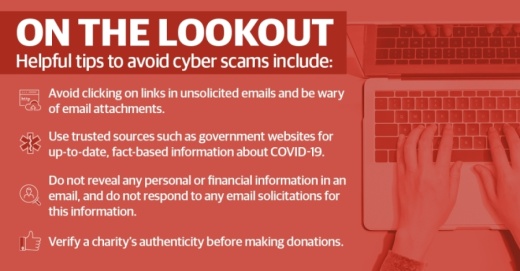Fraudulent websites, fake calls and texts and price gouging are just some of the common tactics used by scammers, according to Paxton.
A disaster declaration issued by Gov. Greg Abbott is in effect across the state, and the order makes it illegal for anyone to take advantage of the declaration by engaging in deceptive trade practices.
In addition, price gouging is illegal under the Texas Deceptive Trade Practices Act.
Any businesses that engages in price gouging may be subject to civil penalties of up to $10,000, with a possible additional penalty of $250,000 if elderly customers are affected.
A price gouger is anyone “who takes advantage of a disaster declaration by selling necessities at an excessive price, including retail suppliers in grocery and pharmacy chains,” Paxton said. “No one is exempt from price gouging laws in Texas, and those who violate the Texas Deceptive Trade Practices Act will be met with the full force of the law.”
Paxton’s office is also warning consumers about cyber scams that use fake emails or text messages and include attachments to fraudulent websites. These scams are designed to deceive residents into providing sensitive information or donating to a fake charity.
“Any email or social media post with a 'Coronavirus (COVID-19)' subject line, attachment or hyperlink should be treated with caution,” Paxton’s office said.
Helpful tips to avoid cyber scams include:
- Avoid clicking on links in unsolicited emails and be wary of email attachments;
- Use trusted sources—like legitimate government websites—for up-to-date, fact-based information about COVID-19;
- Do not reveal any personal or financial information in an email, and do not respond to any email solicitations for this information; and
- Verify a charity’s authenticity before making donations.
Scammers using public health emergencies as an opportunity are likely to target older populations, she said.
“Scammers often use fear-based tactics to convince people that a vaccine or cure is now being offered,” she said. “There is currently no FDA-approved vaccine for COVID-19, and although there may be treatments for symptoms, there is no cure.”
Residents should also note that although the Centers for Disease Control and Prevention or other public health officials might contact someone believed to have been exposed to the virus, they will not ask for insurance or financial information, Salazar said.
The Senior Medicare Patrol recommends the following tips to avoid scams for Medicare, Social Security and other government beneficiaries.
- Contact your doctor if you experience COVID-19 symptoms.
- Do not provide Medicare, Social Security or other personal information in response to unsolicited calls, texts, emails, home visits or booths at health fairs or other venues.
- Be suspicious of door-to-door offers for free COVID-19 testing, supplies or treatment.
- Review your Medicare Summary Notice or Explanation of Benefits for errors or claims for products or services that were not received.
- Follow instructions from state and local governments on additional actions that should be taken in response to COVID-19.





